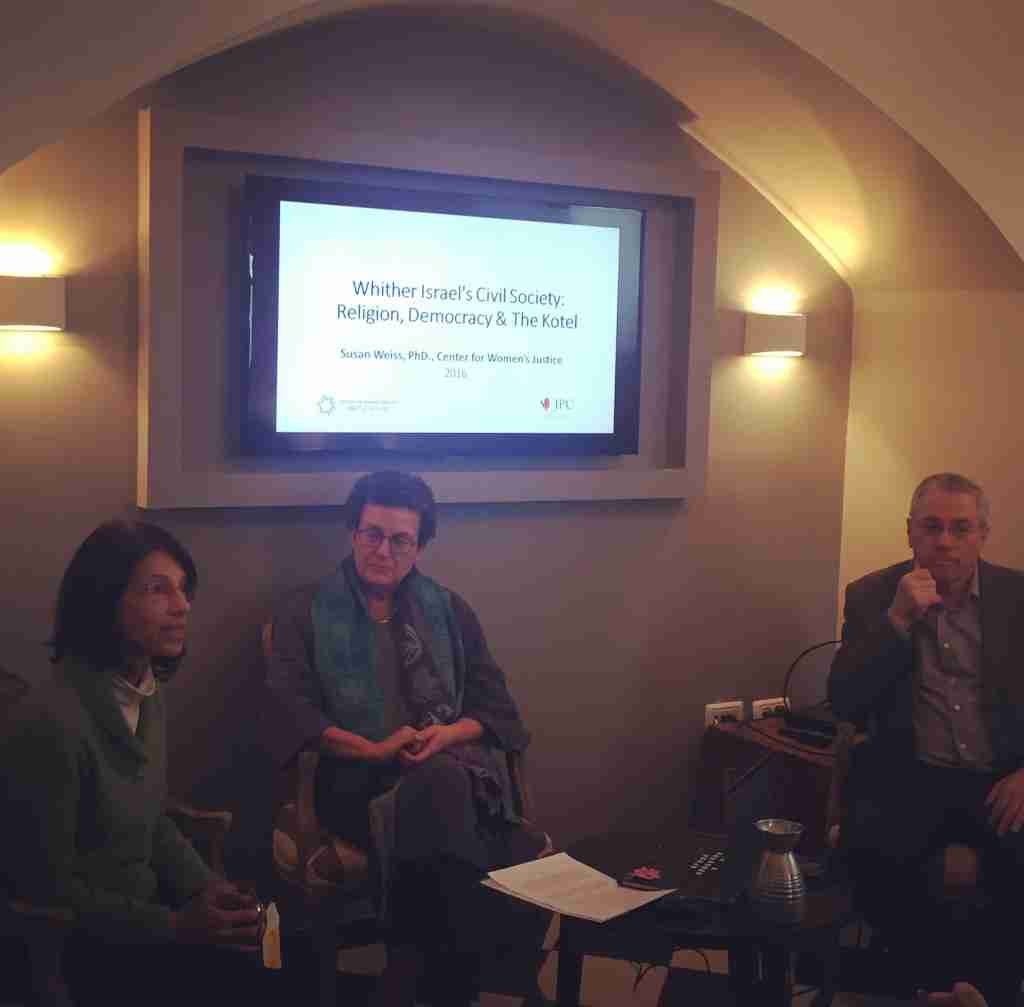JPC hosted Dr. Susan Weiss, Executive Director of the Center for Women’s Justice and Prof. Shulamit Magnus, a founder of Original Women of the Wall, Professor of Jewish Studies and History at Oberlin College. They spoke about “Whither Israel’s Civil Society: Religion, Democracy & The Kotel”. Both speakers presented their two-decade work to create legal solutions that protect Israeli women from human rights violations stemming from Israel’s entanglement of religion and state.

About the speakers:
Dr. Susan Weiss is an attorney and Ph.D. anthropologist and sociologist. Long acknowledged as a legal gadfly and innovator, she has been actively working for more than 20 years to create legal solutions that protect Israeli women from human rights violations stemming from Israel’s entanglement of religion and state. A noted lecturer and author, Susan began this work as a private attorney defending divorcing women, intensifying her efforts as the founder and director of Yad L’Isha from 1997-2004. She is currently the executive director of the Jerusalem-based Center for Women’s Justice (CWJ), where she initiated the innovative legal practice of suing recalcitrant Jewish husbands for civil, tort damages if they refuse to deliver a Jewish divorce (a get) to their wives. This tactic has been noted as “game-changing” by leading attorneys as well as the prestigious Ha’aretz news daily. Susan is an editor of “The Law and its Decisor,” a journal published by Bar Ilan University Law School, and has co-authored the book, “Marriage and Divorce in the Jewish State: Israel’s Civil War.” In recognition of her work, Susan has been honored with a number of prestigious awards including the Jewel Bellush Israeli Feminist Award (2013), Israel Bar Association Women in Law Award (2009), and La’Isha magazine’s “Alternative Torch-Bearer” Award (2007).
Prof. Shulamit Magnus is a social and cultural historian specializing in Jewish modernity; her courses span the range of Jewish experience and expression from biblical antiquity to the present and are taught from thematic and comparative perspectives. She is particularly interested in identity and boundary lines in Jewish history and the history of women and gender in Jewish society. She is the author of four books: Jewish Emancipation in a German City: Cologne, 1798-1871 (Stanford University Press, 1997); a two- volume, unabridged translation and annotated, critical edition of Pauline Wengeroff’sMemoirs of a Grandmother: Scenes from the Cultural History of the Jews in Russia in the Nineteenth Century (Stanford University Press, 2010; 2014), volume one of which won the National Jewish Book Award; Volume Two of which won the Hadassah-Brandeis Institute Translation Award (2013). In press is a new book, A Woman’s Life: Pauline Wengeroff and Memoirs of a Grandmother (The Littman Library of Jewish Civilization), which is a biography of Wengeroff (1833-1916) and her path breaking Memoirs, which treat women’s– and men’s– experience in emerging Jewish modernity as subjects of inquiry (as opposed to ignoring that of women and making that of men the group’s presumed norm), and which is the first published work by a Jewish woman on the history of an era. The biography traces how and why Wengeroff’s remarkable memoirs came to be the work we have in hand.

